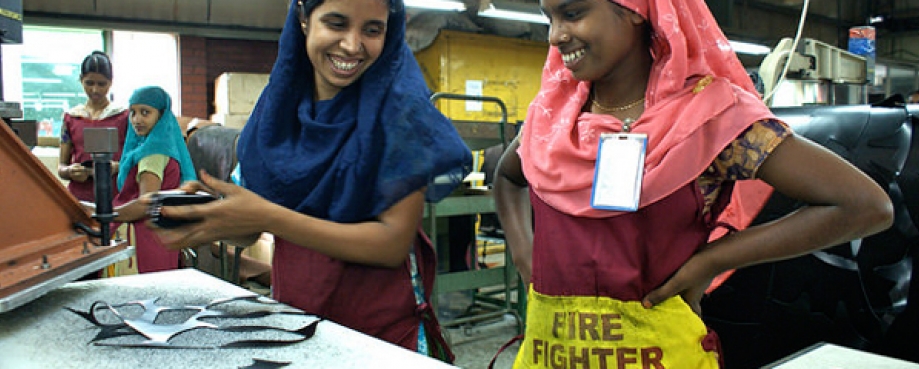
On the achievements of the The Bangladesh Accord on Fire and Building Safety, now two years old.
It isn't the best time to visit Dhaka; the humidity levels climb as the monsoon approaches and even the sudden, violent rain storms do not bring the temperature down. But hotels are full, as foreign buyers make up for lost time. Earlier this year, business was hit as opposition parties called hartals (usually mistranslated as strikes) to protest against the government. More than a hundred people were killed as opposition supporters attacked public transport. The garment industry lost millions in lost exports and delayed orders.
On the bright side, the industry is making some progress on safety and health, thanks to the Bangladesh Accord on Fire and Building Safety, which has just celebrated its second birthday. It is a unique and legally binding agreement, put in place after the Rana Plaza disaster, between trade unions and brands, including many ETI members.
1500 factories covered under the Accord have been inspected for fire, electrical and structural safety. A total of 54,432 issues were found in those three areas. Good progress has been made in correcting many of the problems especially in the area of electrical safety. As I pointed out in a blog last year, most fires are caused by electrical faults.
And two factories have fixed ALL the fire, electrical, and structural safety problems that Accord inspections found.
Overall around 20% of issues have been fixed, although just over 2,500 of the remediation actions have actually been verified. A small group of factories - 35 in all - are dragging their heels and have been warned by the Accord.
You could spin these results of course, but I belong to “the glass is half full” school of thought, and think it’s an extraordinary achievement to get this level of improvement in Bangladesh. The work has been done by a dedicated team and support from brands has been crucial.
That is the good news. The Accord has done a great job. It's a pity we can't say the same about the Government of Bangladesh which after Rana Plaza, committed itself to revisions to the law in line with various ILO recommendations. It has promised to make these changes, and to issue new rules to implement changes to the law made in 2013.
Every few months, the ILO sets a new deadline for the government to issues these much needed changes to the law. And the deadline keeps being extended...and extended...and extended. The latest deadline is the end of June. Ever seen the film Groundhog Day? The same thing happens over and over again?
What about the workers?
As the Accord, and the rival Alliance have both repeatedly stated, long term, sustainable occupational safety and health (OSH) in Bangladesh garment factories will only happen if workers are involved. As I keep pointing out in these blogs, a trade union presence halves accidents. So it's funny to read about companies who say "safety is our top priority" and systematically exclude trade unions from the workplace.
In Bangladesh, trade unions are still rare. So the Accord has proposed that Safety Committees be set up. The amendments made to the Bangladesh Labour Act in 2013 included this provision, but no details on how these were to be set up. So two years have passed, and no committees are functioning while everybody waits for the slothful Bangladesh government to gazette the rules.
My personal view is that rather than waiting for the government of Bangladesh to issue the rules, the Accord would have done better to push for real elections to the existing legal structure, the Participation Committees, which have safety and health included in their functions (section 206 of the Bangladesh Labour Act). The elected worker members could have been involved in Accord inspections, reviewing reports, following up on progress and got trained up on the many other OSH issues that crop up in factories. But that’s a minority report.
The Accord is now pushing factories to set up Safety Committees on a voluntary basis without waiting for the rules from the government, using the same procedures (the Industrial Relations Rules, 1977) for setting them up as the – wait for it – Participation Committees.
It will be interesting to see what the long awaited rules say about elections to Safety Committees - if they ever see the light of day. I doubt Bangladesh employers are going to welcome two elected structures for worker voice; so a weaker, nominated Safety Committee may possibly emerge.
The battle to empower garment workers to have a real say over their own safety is going to be a long and hard one. Maybe even tougher than getting 1,500 factories to fix fire doors, sort out the electrical faults, and make sure they don’t fall down.
